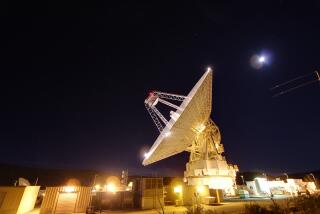Lawmaker Doubts NASA Can Carry Out Its Missions
- Share via
WASHINGTON — The chairman of a House subcommittee beginning a yearlong investigation of NASA said Thursday that he has no confidence that the space agency can be trusted to carry out its missions.
Rep. Howard Wolpe (D-Mich.) cited NASA’s string of recent embarrassments, including the defective Hubble Space Telescope, the delays in shuttle launchings and the series of redesigns of the proposed space station.
“What has gone wrong with NASA?” he asked. “It’s not hard to understand. NASA made it to the moon, and it wouldn’t be the first organization that celebrated by resting on its laurels.”
As Wolpe opened the hearing by his subcommittee on investigation and oversight, the congressional Office of Technology Assessment issued a report saying that President Bush’s $300-billion to $550-billion proposal for moon-Mars exploration may not get public support.
It said that, even if the effort is on the cheaper end of the estimate, it would require a substantial addition to NASA’s budget, which was $13.4 billion this year.
The money and political support will not be needed during Bush’s presidency but “must be provided over many presidencies and Congresses,” the Office of Technology Assessment said.
“The government is no longer an automatic teller machine. When Congress decides to support missions to Mars or Jupiter, it means deferring or denying some equally worthy goal,” Wolpe said at the hearing.
Aerospace experts testified that the U.S. space program is facing an internal crisis caused by mismanagement, bloated budgets and poor oversight of contractors.
One highly critical witness, engineering consultant Roger Boisjoly, said the National Aeronautics and Space Administration already has moved beyond the crisis stage and risks “death by internal failure” of management.
Boisjoly, formerly an engineer with Morton Thiokol Inc., which makes the shuttle’s booster rockets, gained national attention in 1986 after publicly criticizing flawed decisions that led to the space shuttle Challenger explosion.
He and others said part of the problem lies in the way NASA works with its contractors.
David Packard, chairman of Hewlett-Packard, said that, instead of being paid bonuses for sticking to a schedule, contractors should be penalized if they fall behind or make a faulty product.
“The Hubble Space Telescope is a good example,” Packard said, noting that Hubble’s contractor failed to test a key light-collecting mirror before launching. The mirror’s flaws were not apparent until the first images from the orbiting telescope were beamed back.
“The contractor should have received a severe penalty for such a failure--even one that might have put him out of business,” Packard said.
More to Read
Sign up for Essential California
The most important California stories and recommendations in your inbox every morning.
You may occasionally receive promotional content from the Los Angeles Times.













